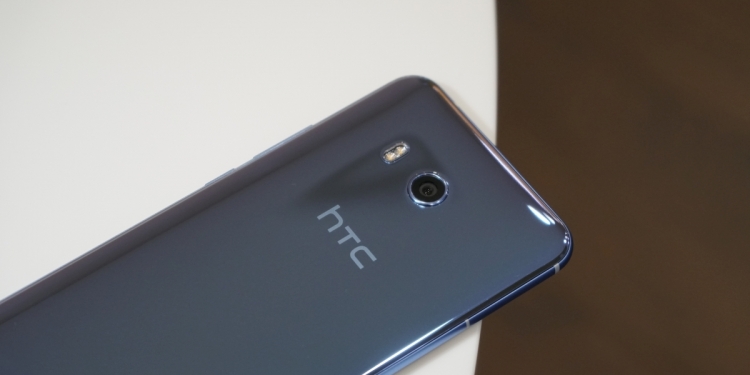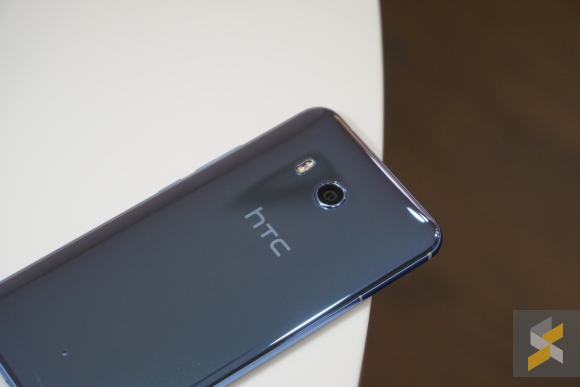What do you do when you’re the best in the world at something? Well, if you’re HTC, apparently, you stop doing it because, with the company’s brand new HTC U11 smartphone, it looks like the Taiwanese tech giant is putting the final nail in the coffin for their metal-bodied flagship devices.
RIP.
Thankfully, the other stuff on the HTC U11 looks pretty good.
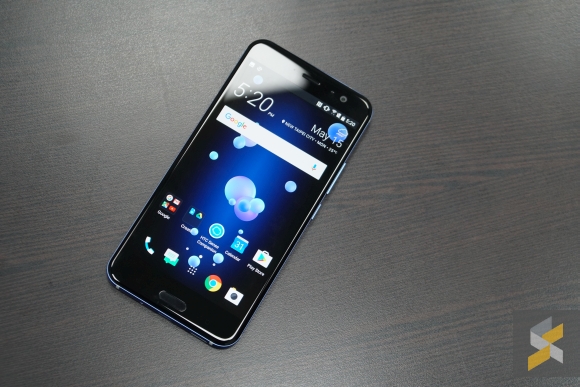
First up we have the specs. Keeping to 2017’s trend of more power than last year (though I guess that’s the trend every ear) the HTC U11 sports top-of-the-line specs almost across the board. At its core is a Snapdragon 835 processor with 4GB/6GB of RAM plus 64GB/128GB of internal storage. That’s about as high as it gets in the smartphone world so the U11 definitely won’t be lacking in firepower. One really unfortunate thing about the HTC U11’s hardware specs come in the form of a 3,000 mAh battery. Let’s not sugar-coat it — that’s absolutely tiny.
Its display is a 5.5-inch Quad HD display that’s supposedly got a “3D glass” screen design on top of it which will give it crisp and clear images even under direct sunlight. This 3D glass treatment extends to the back of the phone too as the U11 adopts the liquid glass surface that first made its debut with the older HTC U smartphones. It’s highly reflective and will supposedly “transform light with every movement you make”, whatever that means.
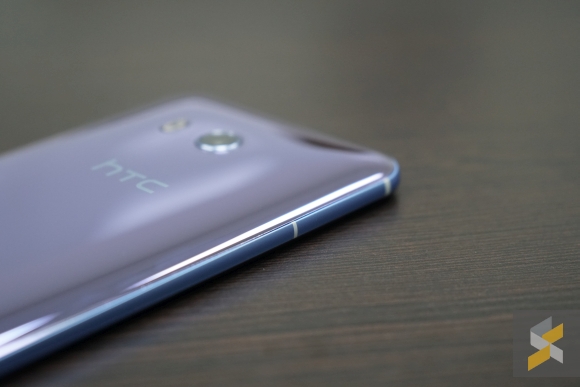
Connecting the front and back glass plates is a metal frame that’s rounded out to fit better in your hand. HTC fans will be happy to know that the U11 finally features IP67 dust and water resistance — same as Apple’s iPhone 7 — so it can survive being submerged in water up to 1m deep for up to 30 minutes. There’s also a front-facing fingerprint scanner.
HTC has also upgraded their BoomSound Hi-Fi edition onboard speakers so that they’re louder and have better dynamic range audio. The tweeter also has an acoustic chamber that will supposedly allow the mids and highs to sound richer. The low frequency “woofer” speaker at the bottom also sports an improved speaker unit with an improved magnetic circuit design for “louder, clearer and deeper bass tones”.
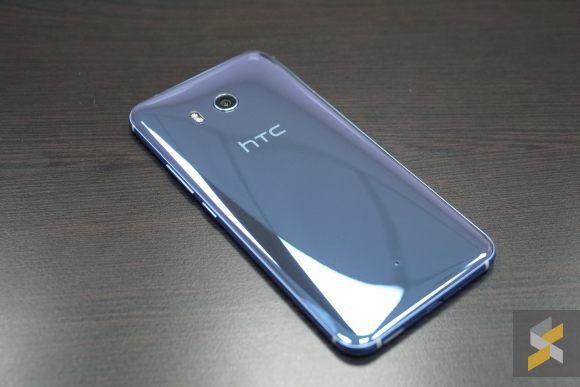
But that’s not all when it comes to the U11’s audio prowess. HTC has improved the handset’s microphones too. Now they use four “optimally positioned” omni-directional mics with their new Acoustic Focus technology that boasts record the “best” 3D audio recording quality yet.
Unfortunately, HTC did not bring back the 3.5mm headphone jack which is still a huge bummer. They do include a 3.5mm to USB Type-C adapter with a built-in DAC, however. HTC also includes a brand new pair of headphones called the USonic which feature active noise cancellation (ANC) and the same sonar technology to adapt audio to your ears which sounds pretty awesome.
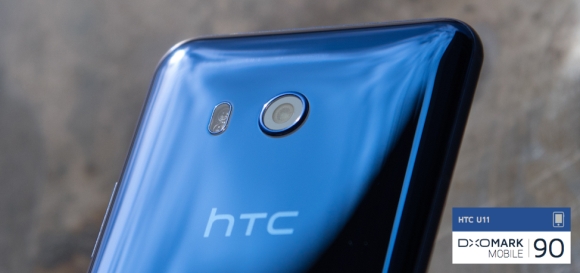
Moving on to the next fundamental feature: The U11’s camera and boy are they proud of it. Of course, that’s for good reason because renowned camera test site DxOMark just gave the U11 the highest score ever in the mobile segment, 90, beating last year’s champion, the Google Pixel. Yeap, my jaw hit the floor too.
In any case, the U11 sports a 12-megapixel UltraPixel 3 sensor with 1.4-micron pixels and something HTC calls UltraSpeed Autofocus. It’s also got a fast f/1.7 aperture camera, Dual LED flash and optical image stabilisation. It’s also sporting a feature called Auto HDR Boost which will supposedly give you all the benefits of HDR photography without the lag that it usually comes with. HTC hasn’t forgotten about the selfie shooter either because you get a 16-megapixel unit in front with the same HDR Boost technology as the primary shooter.
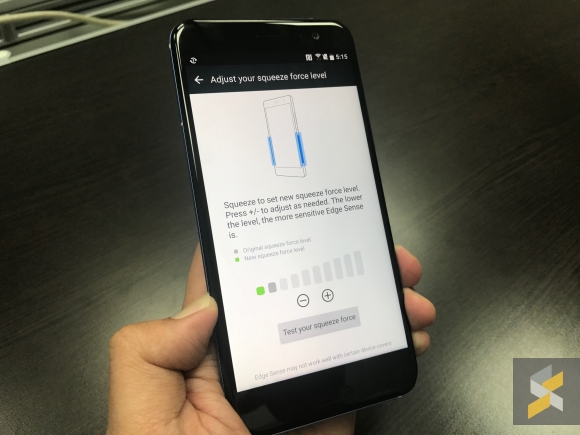
But now we come to the more, shall I say, questionable parts of the U11. To stand out from the crowd, HTC is banking on a new form of interaction with the smartphone and they’re going to do that by making you squeeze the sides of the smartphone. Why squeezing? HTC says that squeezing is the most natural form of interaction because babies squeeze their their mother’s finger and you squeeze the hand of the one you love.
I mean, I’ll let you draw your own conclusions here, but the fundamentals of this tech means that you can squeeze the sides of the phone and have it do various things. You can launch apps (including third-party ones), take a photo, launch the Google Assistant, use voice to text, open an email among other things. You can also squeeze and hold to do even more stuff.
HTC calls this Edge Sense and we’re not super conviced about it. Though, stay tuned for our full hands-on with the U11 where we’ll go into more detail regarding this squeezing.
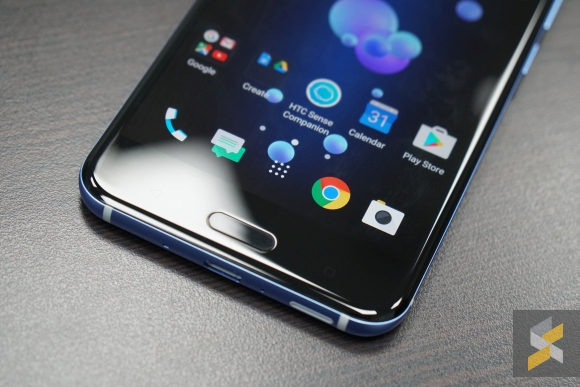
Besides that, the HTC U11 also features three intelligent assistants to help you though your tasts: Google Assistant, Amazon Alexa and HTC Sense Companion. In China, HTC will also offer Duer AI Assistant as well. Having so many assistants is supposed to help you give you more control over your smartphone and the things its connected to but there is this proverb that says too many cooks spoil the broth. Still, we’ve yet to give this a try so we’ll save our judgement until we do.
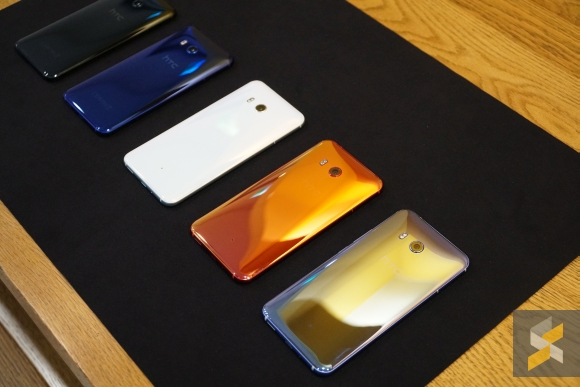
The HTC U11 will be available in five different colours — Amazing Silver, Sapphire Blue, Brilliant Black, Ice White and Solar Red. It will be available starting next week in selected regions while worldwide availability will start in June.
For Malaysian markets
In Malaysia, we will be getting the highest spec variant that features 6GB of RAM and 128GB of internal storage. The lower-spec 4GB RAM + 64GB storage version may come later depending on demand. Availability has been set for June this year, around 7-8 days after the global launch, so stay tuned for more updates then.
Unfortunately, we don’t have information on the local Malaysian pricing yet, but in Europe, this handset is priced pretty close to that of the U Ultra when it launched so we would expect that to be similar here too.
What do you guys think of the U11? Is it a worthy successor to the HTC 10? Let me know in the comments below.
UPDATE: Check out our hands-on and first impressions of the HTC U 11.
Photos shot on Sony a6500

